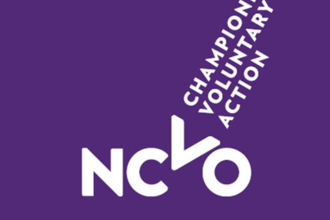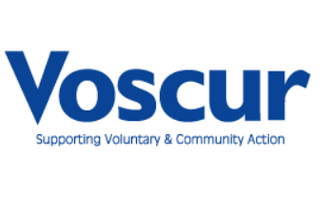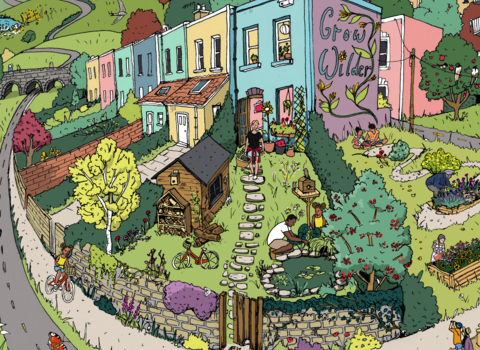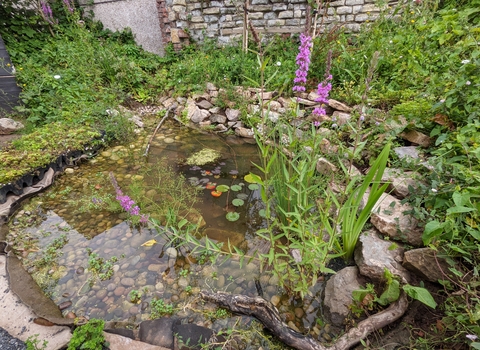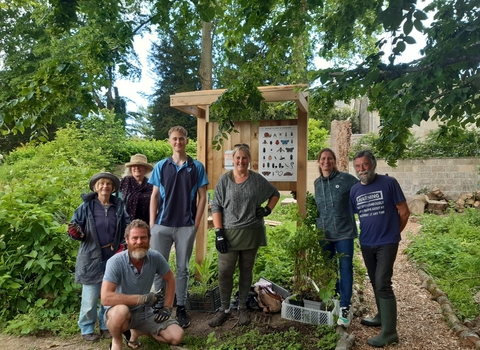Team Wilder Resources Creating a Group
Community Groups Improve the Local Area
A group can be as small as a street, it can be people who want to protect local green spaces, it can be a 'friends of' group, people interested in one topic (wildlife or gardening) or larger community areas or interests. Volunteer groups can manage and improve local green spaces for the needs of the community.
Community Groups are about improving the area for all residents, which may include get-togethers in green spaces, food growing, low cost toddler groups, music, story telling, celebrations. They bring people together from all backgrounds, strengthen community spirit and improve the area.
If you are thinking of setting up a community group:
Good questions to consider
- Start with what is strong not what is wrong! Where is the energy in the community?
- What do you want the group to achieve? Dream big!
- Are there other similar groups that already exist? It's always good to combine efforts if the goals align.
- Who else would be interested and capable of running this group?
- Who would join the group? How would you attract people from all walks of life? What would they get from it?
- Are there local events you could discuss your group at? Speak with as many people as possible, ask questions and listen.
- Where would funding come from? Is funding available?
- Would you run activities and events?
Amazing advice from the Community Action Collective
Participation from day one
Work with communities to check your assumptions, get the low down and build your work together. This will build confidence, trust and keep the energy and momentum going.
Start with what is strong not what is wrong
Start with where the energy is at! Supply proof of concept through ongoing reflection. Evaluation and learning as we go.
Be visible – transparency and honesty is key
Knowing when to let go and let others shine. Being conscious of the image you are being visible with – and what that means to people.
Community from the start
Giving communities the tools they need to create sustainable, community-led work.
Meet people where they are
People may be interested in other primary motivators, other than benefits to nature and climate. Inclusion is key and approachability is the first step! Sometimes it is intimidating to contribute, so work with people where they feel comfortable, in a way relevant to them.
Support one another
Low capacity means often saying ‘No’.
Inclusivity – being part of the movement – for anyone!
Ensuring inclusivity is there throughout the process. Valuing and recognising diversity and input from others. Be conscious of who isn’t in the group and look at how you can include them.
Accessibility
Recognise barriers to participation for diverse groups e.g., accessibility needs, transport and times of day.
The Community Action Collective Advice
Different types of Community Groups
Learn about the differences between community group types and choose a group suited to the needs and aims of your group. The easiest group to set up is called an “unincorporated association”.
- Unincorporated Association
-
Incorporated Group
-
Charitable Trust
-
Charitable Incorporated Organisation (CIO)
-
Company Limited by Guarantee (Limited Company)
-
Charitable Company
-
Community Interest Company (CIC)
Start with what is strong not what is wrong! Where is the energy in the community?Community Action Collective
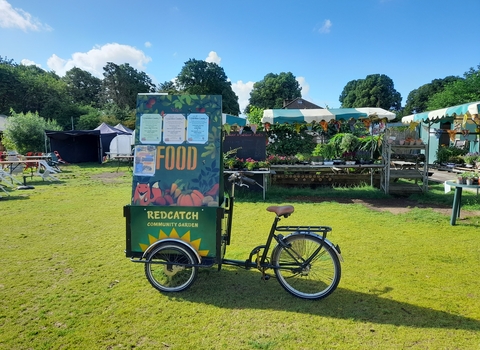
Redcatch Community Garden
Setting up a Basic Community Group
The easiest group to set up is called an “unincorporated association”.
You need to write a “constitution” or “governing document”. This is a list of rules for the group. It also says what your group’s going to do, and how it’s going to do it.
This kind of group:
- isn’t a charity.
Although you can set up a charity if you want to. Make sure you get the right advice if you want to be a charity, because there are different sorts, and this will depend on where you are. - isn’t a separate legal structure, which means the group can’t enter into a contract or own property - but individual members can.
- has members who vote on what the group should do
- if the group changes, it can become a different type of group or a charity later.
Dare to dream, then decide to do.
Essential Actions to Set Up a Group
Writing a Constitution
This advice is for groups, which are not charities. It is an important document - when you’ve written your constitution, get other people to read it and tell you what they think. Then ask everyone in the group to read it.
A constitution summarises what you want to achieve and how you will do it. It is an important document that lays down your aims and rules and is used for reference.
- Decide on a name for your group.
- Write down your aims – what do you want the group to do? Where does the group work, who will the group help, and how will the group help them?
- Memberships. Who is a member? Do members pay a fee? How can people join the group? How can they leave the group?
- Equal opportunities. You might call this Equality, Diversity, and Inclusion. Write about how you will make sure no one is left out.
- Will you have a committee? A committee is a group of people who run the group. The group usually votes for them every year. You don’t have to have a committee. You can share the jobs and take turns. If you do have a committee, how many people will be on the committee, and what will they do? Some committee jobs are Chair (leads the meetings), Secretary (writes down what is said at the meeting), Treasurer (looks after the money). Other jobs include Press Officer (sends stories to the newspapers and answers their questions), Fundraiser (raises money), Membership Secretary (looks after the members).
- If you don’t have a committee, then the whole group runs itself, but you’ll need to decide who looks after the money, and who’ll make notes at a meeting.
- Meetings. Every year, you’ll need to have an AGM – Annual General Meeting. Everyone can come, and you’ll tell everyone what the group has done, and how much money has been spent. If you have a committee, then they’ll be voted for. Write down in your constitution how you want the meetings to be run. Will you vote on decisions or try to “reach a consensus” by talking about it until everyone agrees?
- Finances. You need to write down how you’ll handle money. Make sure you have a bank account just for the group. It’s best to have three people who are called “signatories” which means that there are always two people to agree on payments. You’ll need to keep records of money going in and out, and have a statement to show at the Annual General Meeting. You also need to make sure that if you raise any money, it’s only allowed to be spent on the aims of the group.
- Changing and ending the constitution. In your constitution, you’ll need to write down the rules about how your constitution can be changed, and whether you need to vote on it. You also need to decide who can make the decision to close the group, how that can happen, and what happens to money.
Knowing what Councils and Local Authorities do
And why should I care?
A “Local Authority” can mean any of the different types of council in the UK. There are different systems in England, Scotland, Wales and Northern Ireland. The Crown Dependencies of the Isle of Man and the Channel Islands also have their own way of working.
You need to know who your council is and how to contact them, because they have information about parks, verges, community spaces, planning and more.
Learn more about Local Councils and Local Authorities and see local council links below
Local Council Links to Community Group Info
- Bristol City Council Friends of Groups Advice (https://www.bristol.gov.uk/residents/museums-parks-sports-and-culture/parks-and-open-spaces/volunteering-in-parks/set-up-and-run-a-friends-of-park-group)
- South Gloucestershire Council: The Hive - Community Advice (https://www.southglos.gov.uk/community-and-living/voluntary-organisations/the-hive-home-of-the-community-spaces-network/)
- Bath and North East Somerset Council Friends of Groups and Volunteer Groups (https://beta.bathnes.gov.uk/friends-parks-and-volunteer-groups)
- North Somerset Council Rewilding Project & Contacts (https://www.n-somerset.gov.uk/my-services/libraries-leisure-open-spaces/parks-countryside/rewilding-north-somerset)
When you need Insurance
This is not formal insurance advice...
You will need insurance if you group holds events.
Insurance is a small amount of money that you pay to an insurance company. If something goes wrong, the insurance company should help you. Insurance has two aims.
- It helps you, staff, and volunteers if something goes wrong.
- It helps the public if something goes wrong.
Learn more about Insurance for Local Group
Policies and Procedures, including Risk Assessments
There are a number of policies you will need to create. The link below has a run down of them all. Bristol City Council also have some sample policies you can download and amend, such as risk assessments, accident report forms, attendance sheets. Required policies and procedures include equal opportunity statements, safeguarding, risk assessments, reporting, data protection etc.
TIP: Ask local organisations if you can have a copy of theirs and amend as necessary to save time and effort.
Eg. Redcatch Community Garden did this with other local community group, such as city farms.
Policies & Procedure Advice
- Resource Centre advice on policies (https://www.resourcecentre.org.uk/information/resource-centre-policies-and-procedures/)
- Bristol City Council link to downloadable policies (https://www.bristol.gov.uk/residents/museums-parks-sports-and-culture/parks-and-open-spaces/volunteering-in-parks/set-up-and-run-a-friends-of-park-group)
- Risk Assessment Advice (https://www.avonwildlifetrust.org.uk/team-wilder-resources-risk-assessments)
Training
Health and Safety training is a requirement of Bristol city Council for all Friends of group, once completed you'll also be covered under the Bristol City Council public liability insurance. You can apply here.
South Gloucestershire Council offer free training to community groups. Free training is available to volunteers working in green spaces in South Gloucestershire, they organise First Aid, Waterside Awareness and Brushcutter training. If you are interested in training opportunities, please contact Greenspace.Volunteering@southglos.gov.uk for more information, or to register your interest.
North Somerset Council offer courses for First aid training, community learning courses and Mental Health training.
Bath and North East Somerset offer free training to community groups through The Wellbeing College BANES.
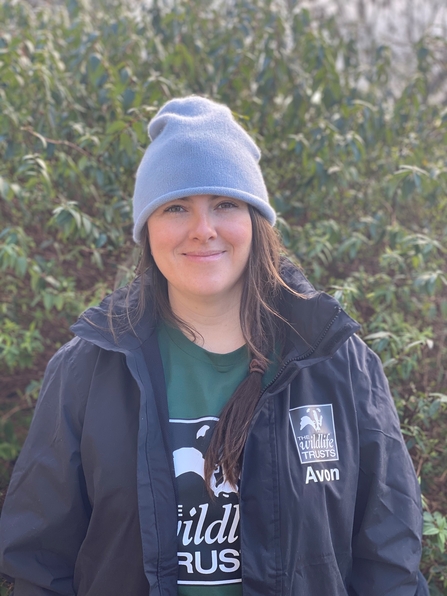
Alex Dommett has set up a Friends of Group in her community in South Gloucestershire. She has some advice for people setting up their own community groups, as well as the resources shown above:
ADVICE: Make allies. Talk to people. Keep asking questions to find the right people to make things happen.
To help find the right people at the council; your local councillor, you can
- *Attend neighbourhood forums and open public meetings.
- Research/find out what the Councils values and aims are – do they have a vision for nature? If not, are they open to discussing further? Can you make any constructive suggestions? What are they already doing well? What would you like to see more of?
- Email the Town Clerk of the Parish or Town Council, as they can help you find out more about who to talk to and what meetings you can join.
- Find out who is responsible for looking after green spaces and wildlife sites in your community by contacting your local council, or by contacting your housing association or management company.
* These can be found listed on council websites. At the beginning of these town meetings, time is allocated for public open questions. These meetings are also recorded and available to watch on YouTube or the council website.
Bristol Community Meetings to get involved in local decision making.
Setting up a community group is different for each community.
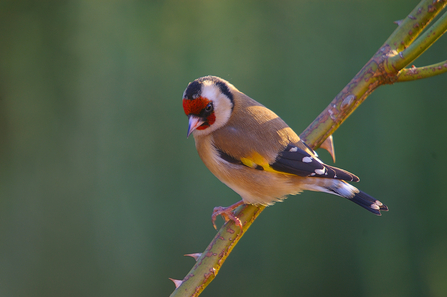
©Neil Aldridge
There is no right or wrong way! Follow your intuition and keep sharing your love of wildlife. Most importantly keep spending time with the wee beasties and creatures that make your neighbourhoods wonderfully wild! What’s better than watching a fox sunbathe beneath a bustling hedgerow, or a charm of goldfinches babbling across the sky…
ADVICE: Share the load by inviting and welcoming other residents to meetings, events and catch-ups. Come together to - reach out, listen to, and inspire your community to work towards shared goals. Everyone has a story and talents that are unique to them - the group should support each other to have their say and get involved in a way which suits them best – it’s very difficult to do everything yourself! The strength of any group or cause is the diversity of voices involved. Sometimes we stumble across blocks, or have different things going on and that’s OK, do things at your own pace and in line with what your group and community needs - lots of small steps can lead to some exciting changes!
Never doubt that a small group of thoughtful, committed citizens can change the world; indeed, it's the only thing that ever has.
Resources

National Lottery Heritage Fund
Be part of Team Wilder
All actions for nature collectively add up and creates life for people and wildlife.
Share your actions for nature, like Tom by sharing and tagging @avonwt on social media and
Log your actions for nature on the map
















